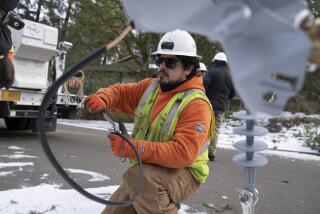Consumer Confidence in December Still Low : Economy: The findings provide fresh evidence that the public is traumatized by announcements of layoffs. But housing industry takes heart from increased sales.
Consumer confidence remained at depressed levels in December, but the extraordinary plunge in public optimism that has dominated headlines and worried political leaders since early autumn slowed down, the Conference Board reported Monday.
Separately, sales of existing homes increased 5.4% in November--the largest jump in six months--fueled by some of the lowest mortgage rates in more than 14 years, according to the National Assn. of Realtors.
The developments were just the latest mixed signals in the on-again, off-again downturn that has puzzled many economists since its onset in July, 1990. The consumer findings were enough, however, to help push the stock market up to new highs, with the Dow Jones industrial average gaining 62.39 to close at a record 3,163.91.
âThe unchanged reading of the consumer confidence index in December, following the free-fall experienced in October-November, is good news,â declared Fabian Linden, executive director of the Conference Boardâs Consumer Research Center. âStill the news is hardly good enough to be reassuring, given the continued deflated level of consumer sentiment.
The Conference Board, a business research group, measured consumer confidence at 52.4 on its index, just below the Novemberâs revised 52.7. The numbers, which tumbled dramatically in October and November to the lowest point in a decade, are considered important, because consumer spending accounts for two-thirds of U.S. economic activity.
Typically, readings of less than 70 on the consumer index are associated with recessions. Todayâs levels are below the nadir of 54.3 hit in the 1982 recession.
âClearly, an appreciable improvement in the consumerâs spirits is a prerequisite for economic recovery,â Linden said in a statement.
The closely followed Conference Board poll provided fresh evidence that the public is traumatized by a recent barrage of layoff announcements. At the same time, it contained perhaps a favorable glimmer or two for the future.
Asked to describe conditions right now, the number of respondents who rated conditions as âgoodâ continued to fall from November; in a similarly bleak note, a growing share of the public agrees that jobs are âhard to get.â
But attitudes toward the future picked up a bit: The number who predict that business conditions will be better in six months was about the same as the number who forecast a decline; in November, pessimists outnumbered optimists.
Some positive news also emerged from the housing industry Monday, as sales of existing homes in November rose to an annual rate of 3.33 million purchases, it was reported, the second straight monthly increase.
âWe are seeing a steady flow of buyers, mainly in the entry-level category,â explained Dorcas T. Helfant, president of the Washington-based National Assn. of Realtors. âThose sales are keeping housing out of the doldrums.â
People who already own their homes, however, have tended to stay out of the housing market, the association said. Lower mortgage rates âhave failed to work much magicâ among âtrade-upâ buyers, because this group remains nervous about the economy and already enjoys some of the advantages of home ownership, such as tax benefits, Helfant said.
Interest rates for conventional, 30-year fixed-rate mortgages averaged 8.71% in November, down from 8.84% in October and the lowest since March, 1977, according to figures from the Federal Home Loan Mortgage Corp.
The South and Midwest led the nation in sales of existing homes, with an 11.3% increase from October in the South and 4.5% rise in the Midwest. Sales in the West fell by 1.9%, and the Northeast stayed the same. But compared to a year ago, sales were up in the West as well--by 6% for an annual rate of 530,000 sales.
Low Interest Rates Spark Homes Sales Existing home sales, seasonally adjusted annual rate, millions of units Nov., â91: 3.33 Oct., â91: 3.16 No., â90: 3.15 Source: National Assn. of Realtors
Consumer Confidence Remains Low From a montly survey of 5,000 U.S. households 1985 equals 100 Dec., â90: 61.2 Dec., â91: 52.4 Source: Conference Board
More to Read
Inside the business of entertainment
The Wide Shot brings you news, analysis and insights on everything from streaming wars to production â and what it all means for the future.
You may occasionally receive promotional content from the Los Angeles Times.










